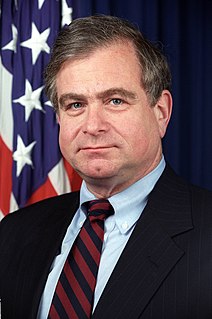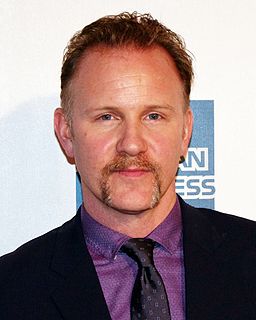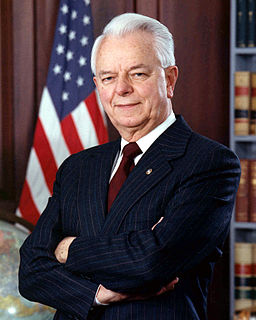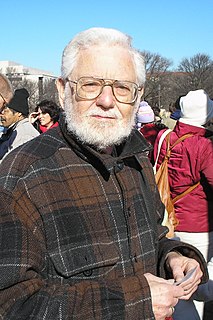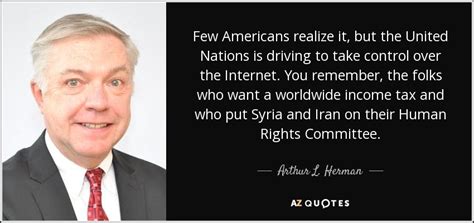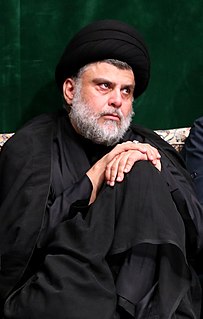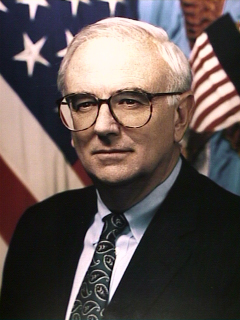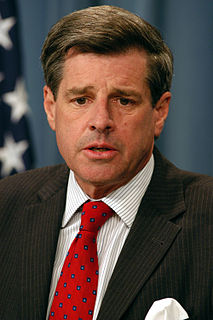Top 714 Saddam Hussein Quotes & Sayings - Page 7
Explore popular Saddam Hussein quotes.
Last updated on April 21, 2025.
Actually, if you look at the essence of ISIS, how it came about, it's the product of foreign invasion. Foreign invasion in Iraq led to removal of Saddam Hussein, and we're not unhappy with that, but the point is that foreign presence in any territory has created dynamics. And you cannot avoid those dynamics.
The first weekend after the attacks of September 11, George W. Bush had a meeting at Camp David with his top advisors, including Colin Powell, the secretary of state. And there was a lively debate about Iraq policy, in which some people from the Pentagon were arguing that the war against terrorism should include Saddam Hussein.
Should President Clinton have killed Osama bin Laden when he had the opportunity in 1990s? Should President Bush have sent the U.S. military into Iraq to depose Saddam Hussein in 2003? Should President Obama have withdrawn all troops from Iraq in 2011? Such questions provide no real insight into future considerations.
My position on that has been misrepresented again and again and again in the media. Let me make it clear. There are two wars in Iraq. The first one was absolutely necessary and entirely justifiable. Saddam Hussein had attacked and invaded Kuwait, a sovereign independent state, it was a blatant act of aggression, and action was justifiable and necessary. I have no problems with that at all.
Dealing with the threat that Secretaries Albright and Cohen have described, the threat from Saddam Hussein, demands constant resolve by the United States and by the international community; and at times, action. As long as he remains in power, we must be prepared to respond firmly to reckless actions that threaten the region and our interests. We've done that successfully over this decade.
The point of a library's existence is not persuasion or evangelism, but knowledge. It is irrelevant to the good library whether, as an institution, it shares or promotes your core values or mine, or the Attorney General's or Saddam Hussein's. The library is always an instrument of choice, and the choice is always yours, not your elected or designated leaders.
I think we had an incredible opportunity to capitalize on that right up to Libya. I think we've made a step toward something that might be a mistake. I personally believe Saddam Hussein and Ghadafi are not good guys by any judgement, and there are ways to deal with it beyond what we did. Once you decide to attack, it paints an ill-conceived picture.
The last UN weapons inspectors left Iraq in October of 1998. We are confident that Saddam Hussein retains some stockpiles of chemical and biological weapons, and that he has since embarked on a crash course to build up his chemical and biological warfare capabilities. Intelligence reports indicate that he is seeking nuclear weapons.
I am proud of the decision of this Administration to overthrow Saddam Hussein. I am proud of the liberation of 25 million Iraqis. And I'm proud to see an Iraq that is now emerging with a stronger government, a truly multiethnic, multi-sectarian government that's about to have its second set of elections, that's inviting private investment into Iraq, and that is making peace with its Arab neighbors.
I slept in Uday Hussein's bed - that was just so strange. Went to Saddam's palace, was in a mortar attack - crazy stuff. And like three days later you're back in traffic on Sunset Boulevard. It's all kind of behind you, which is kind of perfect for a guy like me because I can take that and turn it into quite the tale.
Both Presidents George Bush and Barack Obama pursued policies of regime change after 9/11 - with Bush removing al-Qaida's safe haven in Afghanistan and the sadistic anti-American dictator Saddam Hussein in Iraq - but Obama took it a step further and disregarded regional stability as a guiding factor for U.S. policy.
My hope was that by saying clearly to Saddam Hussein, "we're going to enforce UN Resolutions," that he would make the decision to leave peaceably and at least allow for inspectors to come into his country, and if he chose not to, there would be a military option. I want people to understand that the military was my last option. I had a strategy and hopefully solving the problem peacefully - and it wasn't just me, it was a coalition of nations that were involved.
It was rumored, in 1946, that the hangman in Nuremberg adjusted the nooses of some of the condemned to magnify the pain of suffocation. Such sadism was not called for then and is not called for now. But if fornication is wrong, there is no denying that it can bring pleasure. The death of Saddam Hussein at rope's end brings a pleasure that is undeniable, and absolutely chaste in its provenance.
Not only did I vote against that war, I helped lead the opposition, and if you go to my website, berniesanders.com, you will see the statement that I made in 2002. And it gives me no pleasure to tell you that much of what I feared would happen the day after Saddam Hussein was overthrown, in fact, did happen.
In 2002 and 2003, the Bush administration decided against bombing Zarqawi's camp in northern Iraq because it might derail plans to depose Saddam Hussein. By focusing on Zarqawi in his speech at the United Nations, Secretary of State Colin Powell inadvertently spread his fame throughout the Arab world.
Saddam Hussein is a risk-taking aggressor who has attacked four countries, used chemical weapons against his own people, professed a desire to harm the United States and its allies, and, even faced with the prospect of his regime's imminent destruction, has still refused to abide by Security Council demands that he disarm.
Capturing Saddam Hussein and ensuring that this brutal dictator will never return to power is an important step toward stabilizing Iraq for the Iraqis. Let's also be clear: Our problems in Iraq have not been caused by one man, and this is a moment when the administration can and must launch a major effort to gain international support and win the peace.
Looking at polls of Arab public opinion, you look at popular figures, the most popular figure is the prime minister of Turkey, Erdogan, and then it goes down the list. You get Osama Bin Laden, Saddam Hussein, you don't get Obama, or in fact any western leader. The public doesn't want the whole imperial project. So if you had democracy, it would be all over.
The questions they ask usually in the polls is: do you support the President's attempt to overthrow the government of Saddam Hussein? ... If you ask a question like: do you support the dropping of powerful explosives upon the heads of totally innocent men, women and children, demolishing their homes and their schools and their hospitals, are you in favour of that? That would change the answers, I think, quite a bit.
The Arab peoples possess an ancient and highly developed civilization that is in many ways more sophisticated than our own. For instance, they invented algebra. And this is why we have to go to war with Saddam Hussein this minute and bomb the shish kebab out of him before he invents trig and chemistry and the whole of America flunks high school.
There's no doubt in my mind, though, that the Iraqi people would be better off with a different leader who did not waste their oil on weapons, as opposed to education, as opposed to healthcare, as opposed to food, as opposed to roads, as opposed to clean water. It is really sinful, a crime, what Saddam Hussein has done with the wealth of the Iraqi people over the last 30 years.
If you go against someone, you say, you can't vote for these Democrats, they don't have good values, they're not good people, they're weak, they're spineless, they're don't love America, they're giving aid and comfort to Saddam Hussein, that's the kind of thing I think is bad for America, because it stops the voters from thinking. And any time you stop thinking in a free society you get in trouble.
I'm not holding fast to my position, but to respect the will of the people that decided to choose Saddam Hussein as the leader of the revolution. Therefore, when I say president of the Republic of Iraq, it's not a formality or a holding fast to a position, but rather to reiterate to the Iraqi people that I respect its will.
I don't think it was a patriotic war. I think it was a mistake, a strategic mistake, and I think that the president of the United States wasn't patriotic in going after Saddam Hussein. He simply misled America and cost us casualties and killed and injured America's reputation around the world without valid reason for doing so. It's not patriotic; it's wrong.
In his final year in office, Clinton decided that his contribution to Middle East peace would lie not in the removal of Saddam Hussein but in a grand attempt to resolve the conflict between the Palestinians and Israel. With this, he missed his last chance to deal forcefully with the man he was publicly committed to overthrowing.
And whatever their publicized angst over Saddam Hussein's 'weapons of mass destruction,' American and British authorities were also concerned about violence in an area that harbors a resource indispensable for the functioning of the word economy. I am saddened that it is politically inconvenient to acknowledge what everyone knows: the Iraq war is largely about oil.
If left unchecked, Saddam Hussein will continue to increase his capacity to wage biological and chemical warfare, and will keep trying to develop nuclear weapons. Should he succeed in that endeavor, he could alter the political and security landscape of the Middle East, which as we know all too well affects American security.
Hawks favor war on the grounds that Saddam Hussein is reckless, tyrannical and instinctively aggressive, and that if he comes into possession of nuclear weapons in addition to the weapons of mass destruction he already has, he is likely to use them or share them with terrorists. The threat of mass death on a scale never before seen residing in the hands of an unstable madman is intolerable – and must be preempted.
According to the United Nations Special Commission [UNSCOM], which carried out inspections in Iraq for the better part of a decade, Iraq possesses some 25,000 liters of anthrax. This is, for the record, more than 5 million teaspoons of anthrax. And we have no idea where any of it is. Saddam Hussein has never accounted for one grain of it.
When Saddam Hussein was eliminated, the Iraqi statehood and thousands of people from the former Baath party were also eliminated. Thousands of Iraqi servicemen, who were part of the state's Sunni elite, found themselves thrown out into the street. No one gave a thought about them, and today they end up in the ISIS army.
Countries that need monies so that they can provide health care and education and shelter to their people shouldn't have to repay debts that we knowingly lent to bad regimes long since gone; and all illegitimate debts - debts lent to these terrible dictators like Saddam Hussein, like Suharto, like Marcos - must also be canceled.
